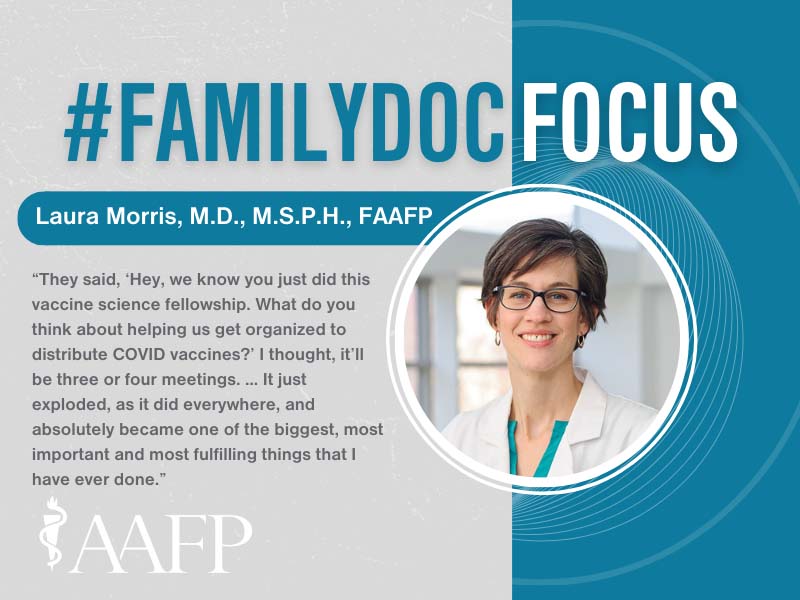Mizzou Mentor Found Her Niche as Vaccine Expert
Aug. 21, 2024, David Mitchell — Laura Morris, M.D., M.S.P.H., FAAFP, was trained to follow the evidence. That mindset put her on a path to become a national expert on immunizations and a chief medical officer and spokesperson for a health system with 80 ambulatory clinics that will provide more than 1 million patient visits this year.

“Evidence-based medicine is a culture here at the University of Missouri and the Department of Family & Community Medicine, and there are many different ways that people participate in that and how we teach it,” said Morris, a professor and chief medical officer for ambulatory care at MU Health Care. “My interest in vaccine science is a natural offshoot of that. There’s a lot of epidemiology involved. There’s a lot of interpreting research studies and applying that information. It’s really satisfying to know that you’re doing something that’s meaningful and effective.”
Morris completed her training at the MU family medicine residency in 2010 and stayed at Mizzou for a faculty development fellowship. In 2015 she was appointed by (then) Gov. Jay Nixon to a state advisory council on childhood immunizations. That council informed state leadership on issues related to vaccine science, policy and legislation until it was disbanded in 2021.
Morris said the advisory council was “very functional and informative” but did not outlive the changing political climate and the pandemic.
Although the council’s work ended, Morris’ interest in vaccines didn’t. In 2018, she was chosen for the AAFP’s Vaccines Science Fellowship, which trains family physicians in vaccinology, vaccine policy development, government relations, and patient-oriented vaccine communication.
“That was incredibly helpful,” said Morris, who attended meetings of the CDC’s Advisory Committee on Immunization Practices, toured pharmaceutical companies, met with scientists working on vaccine development and collaborated with other vaccine fellows. “It deepened my understanding of the whole process behind vaccines, their development, their distribution, the politics, the regulation and communications with patients. It really gave me a lot of additional tools to use where I work and teach, which is still a big part of my career.”
Morris’ fellowship ended as the pandemic was beginning. Since 2020 she has served as co-chair of MU Health Care’s COVID-19 and Influenza Vaccine Committee, providing oversight and expertise to teams delivering vaccinations to employees and the regional community.
It started with a phone call.
“They said, ‘Hey, we know you just did this vaccine science fellowship. What do you think about helping us get organized to distribute COVID vaccines?’” she said. “I thought, it’ll be three or four meetings. We’ll get this going. We’ll have the pharmacy join and we’ll get a team together. It just exploded, as it did everywhere, and absolutely became one of the biggest, most important and most fulfilling things that I have ever done.”
Not to mention challenging.
“There was a moment when people were really grateful for this vaccine,” she said. “And then I actually got hate mail.”
Morris’ role as a vaccine expert thrust her into the role of spokesperson for her health system, first on issues related to COVID-19 and then more broadly for all topics related to ambulatory care. She was named chief medical officer for ambulatory care in January 2024 after serving as associate chief for nearly a year.
“Now I’m the doctor a lot of people see in the local news around here, which is not something I was expecting at all,” she said. “And that is probably a direct offshoot of the Vaccine Science Fellowship.”
With the promotion, Morris had to give up other roles she had enjoyed, including medical director of the medical school’s rural training track, and rural clerkship director as well as associate program director for the family medicine residency.
“I’m challenged and still very happy, but challenged in a different way now,” said Morris, who continues to practice broad-spectrum family medicine. “I deliver babies and take call, so I still am an active part of our obstetrics team, and I supervise and teach residents in clinic.”
In June, Morris became the AAFP’s liaison to the ACIP, which develops recommendations for immunizations in the United States. She also serves on the CDC’s Association of Immunization Managers. The latter role has led to regional partnerships and projects, and Morris is partnering with researchers to improve vaccine uptake and distribution in rural Missouri.
“It has facilitated work that’s outside of the scope of what people do in their clinical practice and focusing more on getting into the administrative side of practices,” she said. “We’re looking at what are the things that we need to do in order to make this easier, to make it more feasible, to make it more cost effective? And then what are the barriers that are getting in the way of getting more vaccines into people’s arms?”